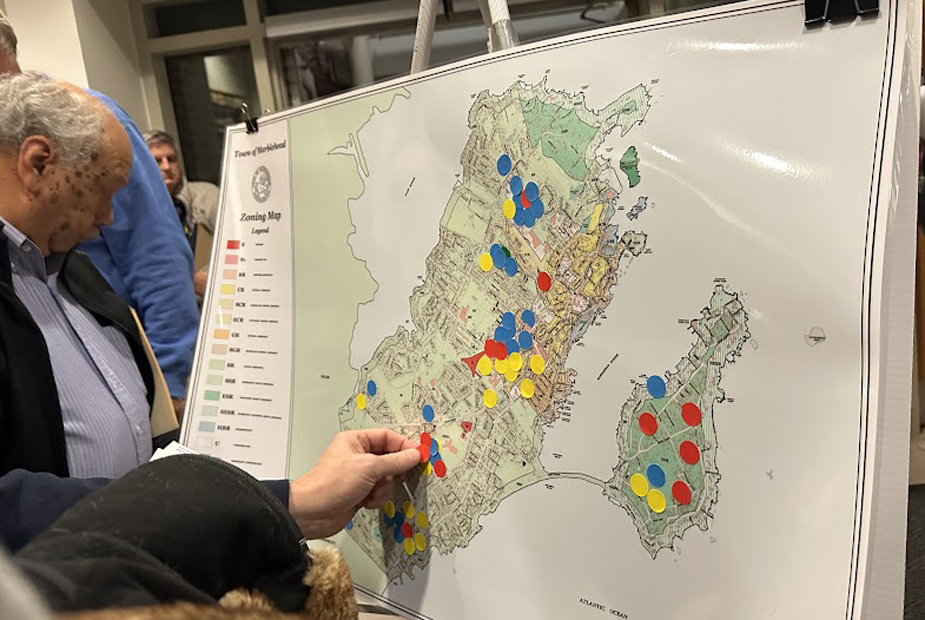Mum’s the Word: Town Officials Silent as Questions Linger on Funds Management
By Lena Robinson and Jenn Schaeffner
Wednesday we published a story about questions pertaining to the Town of Marblehead’s handling of its cash holdings. In spite of failures by the Town to respond to critical pieces of our public records requests related to–among other things–bank accounts, interest rates, cash balances, and banking fees–what we pieced together reveals several problems. One is in the realm of fiduciary duty in managing tens of millions of taxpayer dollars, and another is a lack of transparency by the Town regarding information to which the public is entitled.
We reached out yesterday to town officials–including all five members of the Select Board as well as Town Administrator Thatcher Kezer and members of the Finance Committee (FinCom) to get their reactions to the facts as reported in our story. Separately, we were told by a Town employee who asked not to be named that there were an unusual number of closed-door meetings yesterday, including with lawyers. Of the multiple elected and appointed officials from whom we sought a response, there was a wall of silence from all but two: Select Board member Alexa Singer notified us that she was dealing with a family crisis and unable to provide comment, and Select Board member Erin Noonan responded with the following statement, and provided us with information discussed later in this article.
“Since joining the Select Board 18 months ago, I have posed questions about our banking process to three successive Town Administrators and have never gotten a satisfying response. I suspect part of the reason for that has to do with turnover in that position and in the Finance Director position. It strikes me as another example of how uncritically doing things ‘the way it has always been done’ fails to serve the best interests of Marblehead’s citizens and taxpayers. At the time interest rates started rising early last Fall, the town's Treasurer and Finance Director positions were vacant and the reality is it's not feasible to respond in real time to market fluctuations in that situation. I have full confidence that our new Town Administrator, and our new Finance Director who will be onboarded in March, will proceed with due diligence in addressing this issue.”
Undoubtedly personnel transitions can complicate matters for any organization. It is precisely for this reason that having written policies in place to govern basic financial protocols help to prevent potentially damaging lapses. Additionally, when Marblehead Beacon began asking questions of the Town about its cash management practices–in July, shortly after interest rates had begun climbing–it appears that tens of millions of dollars continued to earn alarmingly low rates. In other words, the Town was put on notice that best practices might not be at play, yet it appears there was no meaningful action, if any. Even while short staffed, it is not unreasonable to imagine that a short telephone call from the Town to National Grand Bank could have resulted in a higher interest rate for the Town and a better outcome for taxpayers.
The Town’s refusal to respond to public records requests followed by myriad officials’ lack of response underscores the existing questions about cash management, including the matter of how the Town of Marblehead plans to proceed in the coming days, weeks, and months vis-à-vis the yield on critical monies in its control. A finance director has been selected and is slated to begin in March. And a brand-new treasurer/collector–Rachel Blaisdell–only began work last month. But the Town having had vacancies in such important positions is something that, arguably, should have brought into sharper focus the imperative for sound financial policies with regard to Marblehead’s $110 million budget.
Earlier today Marblehead Beacon spoke with a former Massachusetts State Treasury official who reviewed information pertaining to yesterday’s story, and who spoke with us on condition of anonymity. “The interest rate is the North Star,” he said, referring to how vital it is for a fiduciary to place a town’s cash resources in a bank vehicle that yields the best interest rate available, while still ensuring it remains liquid. Additionally, he said, “why does the Town of Marblehead not have a policy in place [for overall financial management]?”
As reported in our earlier coverage, we had, at one point, asked Town Administrator Thatcher Kezer what the Town uses as guidance in its decision making for cash management, and he responded by (only) referencing Chapter 11 of the Massachusetts Collectors and Treasurers Association (MCTA) manual. That document states, in pertinent part:
“The treasurer should strive to be constantly aware of the range of services available from area banks. Since banks’ service charges and investment rates vary, the treasurer should regularly evaluate the charges and rates of the banks used by the municipality to make certain that continuing to utilize these banks best serves the interests of the municipality. When selling bonds or notes, the treasurer should endeavor to receive a sufficient number of bids to ensure competitive rates for the borrowed funds. Whether borrowing or investing monies, the treasurer should solicit bids from at least three area banks.”
The limited responses Marblehead Beacon received following our public records requests do not appear indicative of any of the outlined “regular…evalua[tion of] the charges and rates of the banks used by the municipality to make certain that continuing to utilize these banks best serves the interest of the municipality.” In fact, when asked if there had been bids for banking services, Kezer’s response was, “We do not bid out cash management services as a standalone product in addition to the services already provided by said banks. Financial services are exempt under Chapter 30B.”
While financial services are, indeed, exempt from the standard bidding process that vendors must engage in with municipalities, basic fiduciary responsibilities as well as even the broad document the Town apparently uses as guidance suggest that forgoing readily available higher interest rates runs contrary to best practices.
Other Massachusetts towns like Swampscott, Rowley, Dedham, Brookline, Hamilton, and Rockport, for example, have their own more detailed investment/cash management protocols that govern matters such as ethical considerations in choosing banking institutions and maximum funds allowed at any banking institution other than Massachusetts Municipal Depository Trust (MMDT). In Swampscott, for instance, a document (that has a “draft” overlay on it) is published on the town’s website entitled,“Financial Policies Manual.” It states in relevant part:
“To ensure the Town’s public funds achieve the highest possible rates of return that are reasonably available while following prudent standards associated with safety, liquidity and yield, this policy establishes investment guidelines and responsibilities.”
The policies of the towns referenced above all contain language that dictate the practice for the management of cash that must remain liquid, including phrases such as, “prudently selecting and diversifying investment instruments and depository choices,” and “no more than 10% of the overall portfolio may be invested in deposits with a single bank, unless the deposits are fully-insured or fully-collateralized.”
With respect to how it is possible that the Town of Marblehead does not have such a policy in place, Noonan, who says she has long advocated for such a policy, advised us that sometime in late 2021 or early 2022, the Select Board was presented with an incomplete draft of a document that was going to dictate similar policies. Her recollection is that the then-Finance Department was working on a nearly finalized document that, upon its completion, would be brought back to the Select Board for a vote. “We never ended up voting it because they weren’t finished finalizing it,” she said, “and the Fincom was supposed to vote it first.” She added, “[t]hen Jason [Silva] left, John McGinn was here basically to get us through Town Meeting, and Steve Poulos left.”
The information provided by Noonan references the following: former Town Administrator Jason Silva, who resigned in January 2022; John McGinn, who served as Interim Town Administration until Kezer began, and who then offered to consult until sometime in mid- to late-2022 (though Marblehead Beacon has learned that he was present in the Town’s administrative offices as recently as yesterday); Steve Poulos, who was Marblehead’s Finance Director until early January 2022; and Aleesha Nunley-Benjamin, who currently works for the Town of Littleton and is scheduled to begin the role of Finance Director in March.
Would having policies in place similar to those in other towns have changed the management of the town’s cash? It is unclear, because even the MCTA manual that Kezer claimed governs such matters does not appear to have been adhered to. Nevertheless, it does seem fairly certain that having such policies is considered a rudimentary best practice.
We remain hopeful that the Town will fulfill our information request. In the meantime, Marblehead Beacon has filed an appeal with the Secretary of State’s office in an effort to enforce compliance with the state’s public records law.








